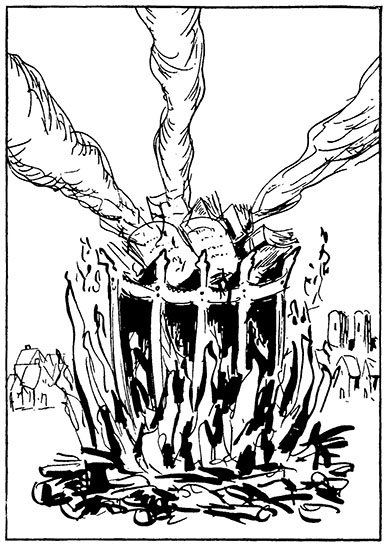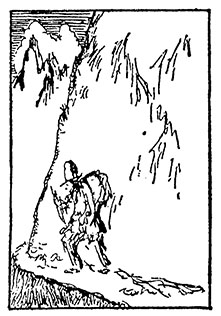Chapter 10 9. War on the Book
I find it increasingly difficult to write history.It's like I learned to play the violin since I was a child, but when I was thirty-five years old, someone suddenly gave me a piano and ordered me to live like a clavel player, with the reason that "the piano is also music".I've learned a skill in one field, but have to do a completely different kind of work.What I have learned is to observe what happened in the past by means of a clearly established order, namely, the States run more efficiently by Emperors, Kings, Grand Dukes, and Presidents, assisted by Deputies, Senators, and Treasury Secretary.And when I was young, God was still the supreme being in charge of all things in everyone's mind, and he had to be worshiped with proper etiquette.
Then war broke out.
The old order was overturned, emperors and kings were deposed, responsible ministers were replaced by irresponsible secret councils, in many parts of the world the gates of heaven were closed by edicts issued without the consent of parliament, a dead Economic hacks are officially recognized as the heirs of all the prophets of all ages.
Of course all this is short-lived, but it will take centuries for civilization to catch up, and by then I will be long gone.
I have to make the most of what I have, and it's not easy.
Take the case of Russia.When I lived in this so-called "sacred place" for a while about twenty years ago, the foreign papers we got always had an entire quarter of a page blacked out, technically called "caviar".This smear is to erase some content, because the careful government does not want to let the beloved subjects know.
The whole world sees this kind of surveillance as a resurgence of the "Dark Ages" and it is intolerable that the people of the great Western republics keep a few copies of American funny newspapers smeared with "caviar" and show them to the common people in their countries to let them know The well-known Russians are actually backward barbarians.
I grew up in a more enlightened society that believed in Milton's dictum: "The highest form of liberty is freedom to know, to speak, and to argue according to one's own conscience."
As described in the movie, "war broke out", so I saw that in the past, "Sermon on the Mount Kinabalu" was declared a dangerous document in Germany, and it was not allowed to be circulated among millions of kingdom subjects. If the editors and printers published it It gets fined or jailed.
In view of this, it seems wiser to abandon the study of history and write short stories or run estates.
But this is admitting defeat, I'm going to stick to my job and try to remember that in a well-ordered country every upright citizen should have the right to speak, think and say what he or she thinks is right, as long as it doesn't interfere with the happiness of others , do not violate the etiquette of civilized society and do not violate the system of the local police station.
Of course, this puts me on record as the enemy of all official publication censorship.In my opinion, the police should go after pornographic magazines and newspapers that are printed for personal gain.As for the others, whoever wants to print anything can print it.
I say this not to say that I am an idealist or a reformer. I am very practical, I hate wasting energy, and I am familiar with the history of the past five hundred years.This history clearly shows that no violent subjugation of words and speech ever serves any good.
Nonsense and nonsense are like explosives. They can only be dangerous if they are placed in a small and sealed container and hit by an external force.If a poor wretch is allowed to give a speech, he can at most attract a few curious audiences, and his painstaking efforts will only become the butt of everyone's ridicule.
The same man, handcuffed by an illiterate and rude magistrate, sent to prison, and sentenced to thirty-five years in solitary confinement, would become the object of sympathy, and would at last be hailed as a martyr.
But remember:
There are martyrs who die for good, and outlaws who die for evil, and the latter are so cunning that no one knows what they will do next.
So I advocate, let them speak and write.If it is true, we should know it, otherwise it will be quickly forgotten.The Greeks seem to be aware of this, and the Romans did the same before the imperial era.But as soon as the commander-in-chief of the Roman army became a demigod of the empire, a distant relative of Jupiter, far removed from the common people, everything changed.

suppress
The heinous crime of "deceiving the emperor and committing crimes" was concocted.This is a political crime. From the time of Augustus to the reign of Justinian, many people were thrown into prison just because they were slightly offended by their outspoken words.But if the Roman emperors were left alone, there would be very few topics of conversation to avoid.
Gone are the happy days when the Church rules the world.
Within a few years of Jesus' death, there was a clear dividing line between good and evil, orthodoxy and paganism.In the late first century, Saint Paul traveled for a long time around Ephesus in Asia Minor.The amulets and charms of that place are long known.Paul preached everywhere, expelled the devil, and achieved great success, causing many people to admit their pagan errors.As a token of penance, people gathered on a clear day with spellbooks and burned more than $10,000 worth of secret charms, which you can read about in the nineteenth chapter of Acts.
But this is entirely voluntary of the penitent sinner, and the Acts of the Apostles does not say that Paul ever forbade other Ephesians from reading or possessing these things.
This step was not taken until a century later.
Some bishops of the city of Ephesus issued an order that all books containing the saint Paul were forbidden books, and the faithful should not read them.
In the next two hundred years, very few books were banned, because very few books were published.
But after the Council of Nika (325), Christianity became the state religion of the Roman Empire, and the censorship of writing became part of the daily work of priests.Certain books are absolutely prohibited.Other books are called "dangerous goods" and there are warnings that those who read them risk their lives.Authors were advised to seek approval from the authorities for safety before publishing their work, and this created a system in which the author's manuscript had to be sent to the local bishop for approval.
Even so, the author cannot always guarantee the longevity of the work.The pope pronounces the book harmless, while his successor will declare it sacrilegious and immoral.
But in general, this method is more effective in protecting the writer from being burned to ashes with his own work on parchment.At that time, books were still hand-copied, and it took five years to publish a set of three volumes, so this system worked very well.
However, all this was changed by Gutenberg's invention.His alias was Gus Fresh.
From the mid-fifteenth century onwards, enterprising publishers could publish as many as 400 to 500 books in less than two weeks. In a short period of time from 1453 to 1500, Western Europe Readers in China and Southern Europe actually obtained no less than 40,000 books in different editions, which was equivalent to the entire collection of books accumulated by the larger libraries at that time.
The unexpectedly rapid increase in the number of books worried the church.If a heretic who knows he is reading a self-copied copy of Matthew cannot be easily arrested, what else is to be done with twenty million heretics who own twenty million neatly edited volumes?They posed a direct threat to the minds of those in power, and it seemed necessary to appoint a special tribunal to examine all future publications and decide which could be published and which would never see the light of day.
This committee regularly publishes lists of books it considers to contain "prohibited knowledge," resulting in the infamous "Forbidden Books List."It was about as infamous as the Inquisition.
It is not just that the oversight of the printed press is unique to the Catholic Church.The governments of many countries are also afraid that the publications will suddenly come down like an avalanche, threatening the peace of the country.They had already forced publishers to send their manuscripts to public censorship, and any book that was not stamped with the official stamp of approval would not be published.

book seller
However, no country has continued this practice to this day except Rome, and even Rome's situation is very different from that of the middle of the sixteenth century.This is also imperative.The work of publishing was progressing so rapidly that the "Committee on the Prohibited Books" established by the cardinals to review all kinds of printed materials, that is, the Conference of Cardinals, was quickly overwhelmed and unable to cope.In addition to books, there are also pamphlets and mimeographed manuscripts, in the form of newspapers, magazines and leaflets, like a raging flood, no matter how diligent people can read them all in two or three thousand years, let alone review and classify them.
A ruler who inflicts terror and tyranny upon his unfortunate subjects suffers greatly from his tyranny.
In the first century, Tacitus of the Roman Empire declared himself "against the persecution of authors," arguing that "it is a foolish thing, and a book that has never received public attention will be greatly admired."
The Catalog of Prohibited Books confirms this assertion.Once the Reformation succeeded, a large number of banned books rose in status as a guide book for readers who wanted a complete understanding of contemporary literature.And that's not all.Ambitious publishers from Germany and the Low Countries in the seventeenth century had long-term eyes and ears in Rome, collecting the latest books that had been banned or abridged. sent to sponsors.Then the printing houses in Germany and the Netherlands set to work, rushing to print special editions day and night, selling them at high profits, and smuggling them to countries with strict bans by a large number of professional book sellers.
But the volume of books smuggled across borders is limited, and in countries such as Italy, Spain, and Portugal, where until recently Prohibited Books Lists were rampant, the consequences of repressive policies are staggering.
If these countries fall behind in the race to progress, the reason is not hard to find, for not only are foreign textbooks not available to university students, but even the domestic products they are obliged to use are of inferior quality.
The saddest thing is that the Catalog of Prohibited Books has discouraged people from engaging in literature and science anymore, because sane people don't want to work so hard to write a book, only to be "corrected" by incompetent and ignorant censors "It was all in pieces, or it was redacted beyond recognition by the ignorant Inquisition Commission of Inquisition.
He preferred to go fishing, or to pass the time at masquerade balls and taverns.
Perhaps he will sit down and write the story of Don Quixote in complete disappointment with himself and his people.

suppress

book seller
